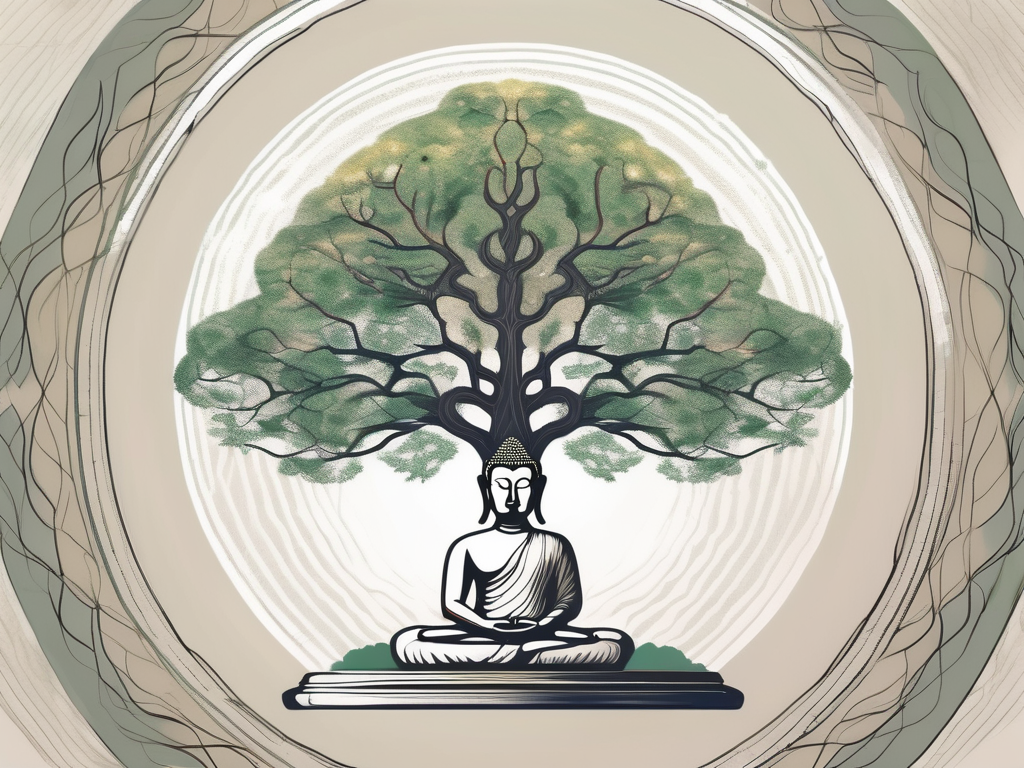Buddhism is a philosophy that encompasses much more than just meditation and mindfulness. One of its core aspects is its moral teachings, which provide a comprehensive guide for leading a virtuous and ethical life. In this article, we will delve into the fundamental principles of Buddhist morality and explore the various facets that contribute to the cultivation of moral behavior.
Understanding the Basics of Buddhism
Before delving into the moral teachings of Buddhism, it is essential to have a basic understanding of this ancient philosophy. Buddhism originated in India over two millennia ago and was founded by Siddhartha Gautama, who became known as the Buddha, meaning the “enlightened one.” At its core, Buddhism seeks to alleviate suffering and attain enlightenment through the pursuit of ethical conduct, mindfulness, and wisdom.
Buddhism is not just a religion but a way of life that offers profound insights into the nature of existence. It provides a comprehensive framework for understanding the human condition and offers practical guidance on how to navigate the complexities of life. By exploring the fundamental principles of Buddhism, one can gain valuable insights into the nature of reality and find a path towards inner peace and liberation.
The Four Noble Truths
Central to Buddhist philosophy are the Four Noble Truths, which form the foundation of understanding suffering and its cessation. The first noble truth asserts that suffering is an inherent part of human existence. It acknowledges that life is filled with various forms of suffering, including physical pain, emotional distress, and existential angst.
However, Buddhism does not view suffering as something to be avoided or ignored. Instead, it encourages individuals to confront suffering head-on and understand its causes and conditions. By acknowledging the reality of suffering, one can develop a deeper sense of empathy and compassion towards oneself and others.
The second noble truth points to desire and attachment as the root cause of suffering. Buddhism teaches that our cravings and attachments to worldly pleasures and material possessions lead to dissatisfaction and discontentment. By clinging to transient and impermanent things, we create a cycle of craving and aversion that perpetuates suffering.
The third noble truth teaches that the cessation of suffering is attainable through the elimination of desire. By letting go of attachments and cultivating a sense of detachment, individuals can break free from the cycle of suffering. This does not mean renouncing all desires but rather developing a healthy relationship with them, understanding their impermanence, and not allowing them to dictate our happiness.
Finally, the fourth noble truth outlines the Eightfold Path as the means to achieve the cessation of suffering and attain happiness. The Eightfold Path serves as a practical guide for living a moral and purposeful life. It consists of eight interconnected aspects: Right Understanding, Right Intention, Right Speech, Right Action, Right Livelihood, Right Effort, Right Mindfulness, and Right Concentration.
By following this path, individuals strive to cultivate wholesome thoughts, actions, and speech, leading to the development of ethical conduct and ultimately liberation from suffering. The Eightfold Path provides a roadmap for personal transformation and spiritual growth, guiding practitioners towards a state of inner peace and enlightenment.
The Middle Way
The Middle Way is another crucial concept in Buddhism, emphasizing the importance of avoiding extreme views and behaviors. It promotes balance and moderation in all aspects of life, avoiding both self-indulgence and self-mortification. The Middle Way encourages individuals to find a harmonious balance between indulging in worldly pleasures and denying oneself of basic needs.
By walking the Middle Way, individuals seek to maintain equilibrium and harmony, leading to a balanced and virtuous existence. This principle applies not only to one’s relationship with material possessions but also to one’s attitudes, beliefs, and emotions. It encourages individuals to cultivate a balanced mindset, free from extreme views and judgments.
The Middle Way teaches us to embrace the complexities and uncertainties of life without falling into the trap of rigid thinking or dogmatic beliefs. It invites us to explore the gray areas and find a middle ground that allows for growth, understanding, and compassion. By practicing the Middle Way, individuals can navigate the challenges of life with wisdom and equanimity.
In conclusion, Buddhism offers profound insights into the nature of existence and provides practical guidance for living a meaningful and purposeful life. By understanding the Four Noble Truths, following the Eightfold Path, and embracing the Middle Way, individuals can embark on a transformative journey towards inner peace, compassion, and enlightenment.
The Five Precepts: The Moral Code of Buddhism
Buddhism encourages followers to adhere to a set of ethical guidelines known as the Five Precepts. These precepts serve as fundamental principles for moral conduct and are observed by lay Buddhists and monastics alike. Let’s explore each of these precepts in detail.
Abstaining from Taking Life
The first precept urges individuals to abstain from taking the lives of sentient beings. Buddhists believe in the interconnectedness of all living beings, recognizing the inherent value and sanctity of life. By refraining from causing harm to others, Buddhists cultivate compassion and respect for all forms of life.
When practicing this precept, Buddhists extend their compassion beyond human beings to include animals and even insects. They may choose to follow a vegetarian or vegan diet to minimize harm to living creatures. Additionally, Buddhists often engage in activities that promote the welfare of animals, such as participating in animal rescue organizations or supporting initiatives that protect endangered species.
Abstaining from Stealing
The second precept emphasizes the importance of refraining from stealing or taking what is not freely given. By respecting the property and belongings of others, Buddhists cultivate honesty, integrity, and a sense of contentment with what they have. This precept extends beyond material possessions to include intellectual property and the stealing of ideas.
Buddhists understand that stealing not only harms the individual whose belongings are taken but also disrupts the social fabric of trust and cooperation. They strive to cultivate a mindset of generosity and gratitude, recognizing that true happiness does not come from accumulating possessions but from developing inner qualities such as kindness and compassion.
Abstaining from Sexual Misconduct
The third precept encourages individuals to refrain from engaging in sexual misconduct. This precept emphasizes the importance of having ethical and consensual relationships, while also recognizing the potential harm caused by sexual misconduct such as infidelity or exploitation. By cultivating sexual integrity, Buddhists create space for healthy relationships and foster trust and respect.
Buddhists approach relationships with mindfulness and compassion, recognizing that the way they engage in intimate connections can have a profound impact on themselves and others. They strive to cultivate qualities such as trust, mutual respect, and open communication in their relationships. This precept also encourages Buddhists to be mindful of the power dynamics that may exist within relationships and to ensure that consent is freely given by all parties involved.
Abstaining from False Speech
The fourth precept emphasizes the importance of truthful and honest communication. Buddhists are encouraged to abstain from lying, deceit, slander, and any form of harmful speech. By cultivating truthful speech, Buddhists build trust, promote understanding, and prevent the harm that can result from false speech.
Buddhists understand that words have the power to either uplift or harm others. They strive to use their speech in a way that brings about harmony and understanding, avoiding gossip, harsh language, and manipulative speech. This precept also extends to the realm of social media and online communication, where Buddhists aim to use technology mindfully and responsibly, avoiding the spread of misinformation or engaging in cyberbullying.
Abstaining from Intoxicants
The fifth precept advises individuals to avoid drugs and intoxicants that cloud the mind and give rise to heedless behavior. By refraining from the use of substances that impair judgment and lead to unwholesome actions, Buddhists strive to maintain clarity of mind and make informed choices that are in alignment with their values.
Buddhists recognize that the use of intoxicants can hinder their spiritual development and lead to harmful consequences for themselves and others. They seek to cultivate mindfulness and awareness, choosing to rely on their own inner resources for happiness and well-being rather than seeking temporary relief through substances. This precept also extends to the consumption of media and entertainment, as Buddhists strive to engage in activities that nourish their minds and promote wholesome qualities.
The Role of Karma in Buddhist Morality
In Buddhism, the concept of karma plays a significant role in understanding the relationship between actions and their consequences. Karma refers to the intentional actions performed by individuals and the moral quality of those actions. Let’s explore the importance of karma in Buddhist morality.
The Law of Karma
The law of karma states that every action, whether mental, verbal, or physical, has consequences. Positive actions lead to positive outcomes, while negative actions lead to negative outcomes. Buddhists believe that individuals are responsible for their own karma and that they will reap the fruits of their actions, both in this life and in future rebirths.
When we delve deeper into the concept of karma, we find that it is not just a simple cause-and-effect relationship. Karma is not merely about punishment or reward; it is a complex interplay of intentions, actions, and their consequences. It takes into account the motivation behind our actions, the level of awareness we bring to our choices, and the impact those choices have on ourselves and others.
For example, let’s consider a person who helps an elderly neighbor carry groceries up the stairs. On the surface, this may seem like a positive action that will lead to positive outcomes. However, the karmic implications go beyond the immediate result. The person’s intention to help, the compassion they feel towards their neighbor, and the selflessness they exhibit all contribute to the positive karmic energy generated by this action. This positive energy not only benefits the person performing the action but also creates a ripple effect of goodwill in the community.
Karma and Ethical Behavior
Karma encourages individuals to engage in ethical behavior by recognizing the long-term consequences of their actions. By understanding that their behavior and intentions have far-reaching effects, Buddhists are motivated to act with kindness, compassion, and integrity. Ethical conduct is seen as an essential aspect of spiritual growth and the path towards liberation.
When we act ethically, we not only create positive karma but also cultivate a sense of inner peace and harmony. Ethical behavior allows us to align our actions with our values and develop a strong moral character. It helps us build trust and establish meaningful connections with others. By practicing ethical behavior, we contribute to the overall well-being of society and create a supportive environment for personal and collective growth.
Moreover, karma serves as a reminder that our actions have consequences beyond this lifetime. It encourages us to consider the long-term impact of our choices and to act in ways that promote the well-being of all beings, not just ourselves. By cultivating positive karma through ethical behavior, we contribute to the creation of a more compassionate and just world.
Karma and Rebirth
In Buddhism, the concept of rebirth is intricately linked to the law of karma. Buddhists believe that life is a continuous cycle of birth, death, and rebirth. The actions performed in each lifetime determine the circumstances of future rebirths. Thus, by cultivating positive karma, individuals can aspire to be reborn in more favorable conditions, closer to achieving enlightenment.
Rebirth is not seen as a punishment or reward but rather as an opportunity for spiritual growth and the realization of ultimate truth. It is believed that the quality of our actions and the state of our mind at the time of death influence the trajectory of our next life. By accumulating positive karma through virtuous actions, we create the conditions for a more favorable rebirth, where we can continue our spiritual journey and strive towards liberation.
It is important to note that the concept of rebirth in Buddhism is not limited to human existence. Buddhists believe in the existence of various realms of rebirth, including heavenly realms, animal realms, and realms of suffering. The law of karma applies to all sentient beings, and the actions we perform can determine the realm in which we are reborn.
By understanding the intricate relationship between karma and rebirth, Buddhists are motivated to live a life of moral integrity, compassion, and wisdom. They recognize that their actions have far-reaching consequences and strive to create positive karma that will lead them closer to enlightenment and liberation from the cycle of rebirth.
The Concept of Compassion in Buddhism
Compassion lies at the heart of Buddhist teachings, motivating individuals to empathize with and alleviate the suffering of others. It encompasses various aspects, each contributing to the cultivation of a compassionate mindset. Let’s explore some of these aspects in detail.
Metta: Loving-Kindness
Metta, meaning loving-kindness, involves cultivating boundless goodwill and benevolence towards all sentient beings. Buddhists aspire to develop a mind free from ill-will and animosity, instead fostering a genuine concern for the welfare and happiness of all living beings. Metta enhances social harmony, fosters positive relationships, and generates a profound sense of interconnectedness.
Karuna: Compassion
Karuna, meaning compassion, involves recognizing and empathizing with the suffering of others. Buddhists cultivate compassion by developing an open heart and actively seeking to alleviate the pain and distress of all beings. By embodying compassion, individuals transcend their self-centered perspective, leading to greater empathy, understanding, and a genuine desire to help others.
Mudita: Sympathetic Joy
Mudita, meaning sympathetic joy, involves taking joy in the happiness and success of others. Buddhists overcome feelings of jealousy and envy by sincerely rejoicing in the achievements and well-being of others. This practice cultivates a sense of interconnectedness and dispels self-centeredness, allowing individuals to experience genuine happiness and contentment in the success of others.
Upekkha: Equanimity
Upekkha, meaning equanimity, involves cultivating a balanced and impartial mindset. Buddhists strive to develop an attitude of non-attachment and acceptance, embracing the ups and downs of life without being swayed by them. Upekkha allows individuals to respond to situations with clarity, compassion, and understanding, fostering a sense of calmness and peace amidst the challenges of life.
In conclusion, the moral teachings of Buddhism serve as a comprehensive guide for leading a virtuous and ethical life. By understanding the fundamental principles of Buddhist morality, individuals can navigate their actions and cultivate positive qualities such as compassion, kindness, and integrity. By walking the path of ethical conduct, practitioners strive to alleviate suffering and attain liberation from the cycle of rebirth, ultimately leading to a deep sense of contentment and happiness.












